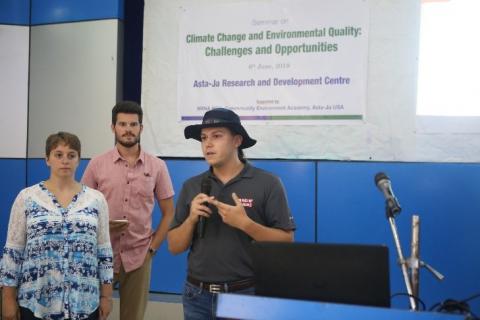KATC Meteorologist Jobie Lagrange visited Hamilton Hall to give a guest lecture about hurricanes for students in Int
Nepal Field Experience Pilot Study Abroad
Fri, 09/06/2019 - 3:24pmMay 21- June 8, 2019
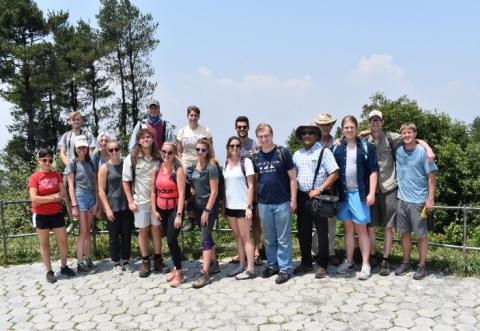
With a view of providing an unsurpassed opportunity to our students, who are mostly from Louisiana, in gaining a comprehensive understanding of Global Climate Change issues, we completed the first Nepal Field Experience Pilot Study Abroad from May 21-June 8, 2019. A total of fifteen students from the University of Louisiana at Lafayette and one graduate student from University of Arizona participated in the program.
Students examined and documented the effects of climate change impacts on agriculture, water resources, wildlife, local communities, forest resources, and other ecological and environmental settings of the region. They identified various climate change mitigation and adaptation measures that had been implemented and noted gaps between policy measures and ground realities. Each student completed an individual research project, synthesized the results, and presented them to local stakeholders.
Research topics selected by the students included the following: climate change impacts on wildlife, water pollution, structural geology of Nepal, changing rainfall patterns and adaptation, climate change and agricultural production, geology of Kathmandu valley, air quality of Kathmandu valley, changing hydrology of glaciated landscape, climate change and geohazards, emerging diseases and pests on agricultural crops, climate change adaptation by local communities, green infrastructure and climate-smart technologies, climate change impact on drinking water sources, the roadside geology, and emerging diseases, parasites and zoonotics.
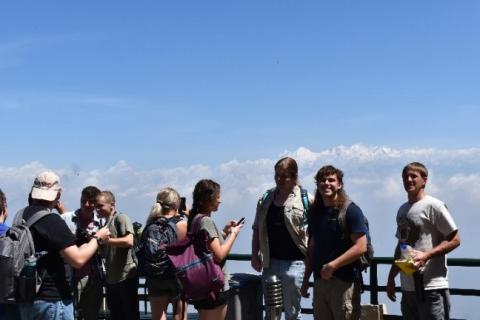
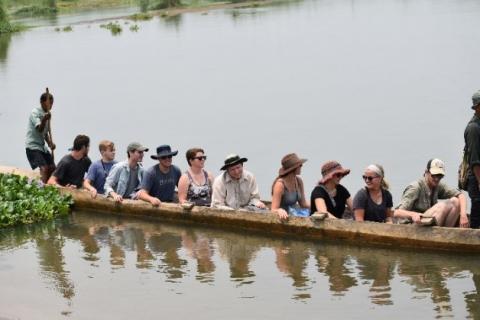
Students visited several institutions including USAID, ICIMOD, Tribhuvan University, Kathmandu University and Asta-Ja Research and Development Center (Asta-Ja RDC) and learned about climate change adaptation activities in Nepal. In order to understand the effects of Global Climate Change on high-altitude agriculture, ecosystems, and the environment, students visited and interacted with local communities in Nagarkot, Chandragiri, Nuwakot, Chitwan National Park, and Pokhara.
In addition to having interviews with local communities around Chitwan national park, students participated in a 4-hour jeep safari in the park. They also stopped by several road-cuts, stream banks, and rock outcrops for field investigation of lithology, mineralogy, environmental settings. They studied caves, waterfalls, river channels, and glacio-fluvial deposited boulders in a glaciated landscape. In order to develop a detailed environmental understanding of air and water pollution, solid waste disposal, flood control, stream management, and the development of green-infrastructure, students spent two days in the Dhobi Khola watershed in the city of Kathmandu.
Students reviewed relevant research papers and publications in relation to their respective research topics, analyzed geological and meteorological data, and interviewed experts in the field. Near the end of the program, students presented their findings to local stakeholders in a conference organized by Asta-Ja RDC in Kathmandu. In addition to the academic field experience, students were exposed to Nepalese culture, tradition, food, society, and pagoda architectural style.
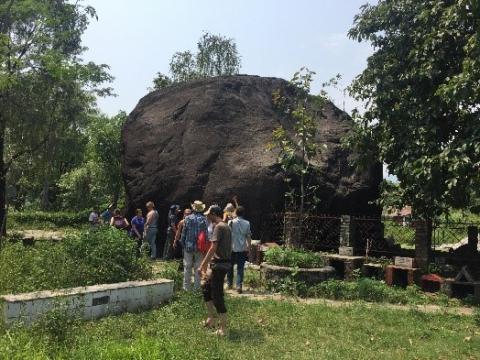
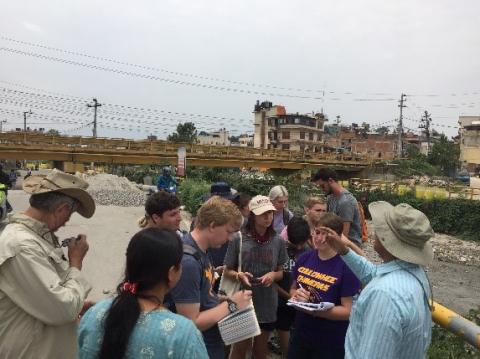
As a pilot study abroad, this was a very successful program. Hotel accommodations, the local support system, the selection of research topics, and the sites for field investigation were outstanding. Some of the key areas where the program needs further improvement include air and road transportation, more free time for students, increasing the general level of class engagement on field activities, group meetings, recording field notes, and stipulating rules and regulations.
In addition, general preparation of the class for the field study is in need of improvement, as well as more clearly defined research activities in the field and proper allocation of time for exposure to local culture, tradition, architecture, and society, all of which will benefit the overall enrichment of the student participants. Preparation for the next field experience will start soon after the beginning of the academic year.
